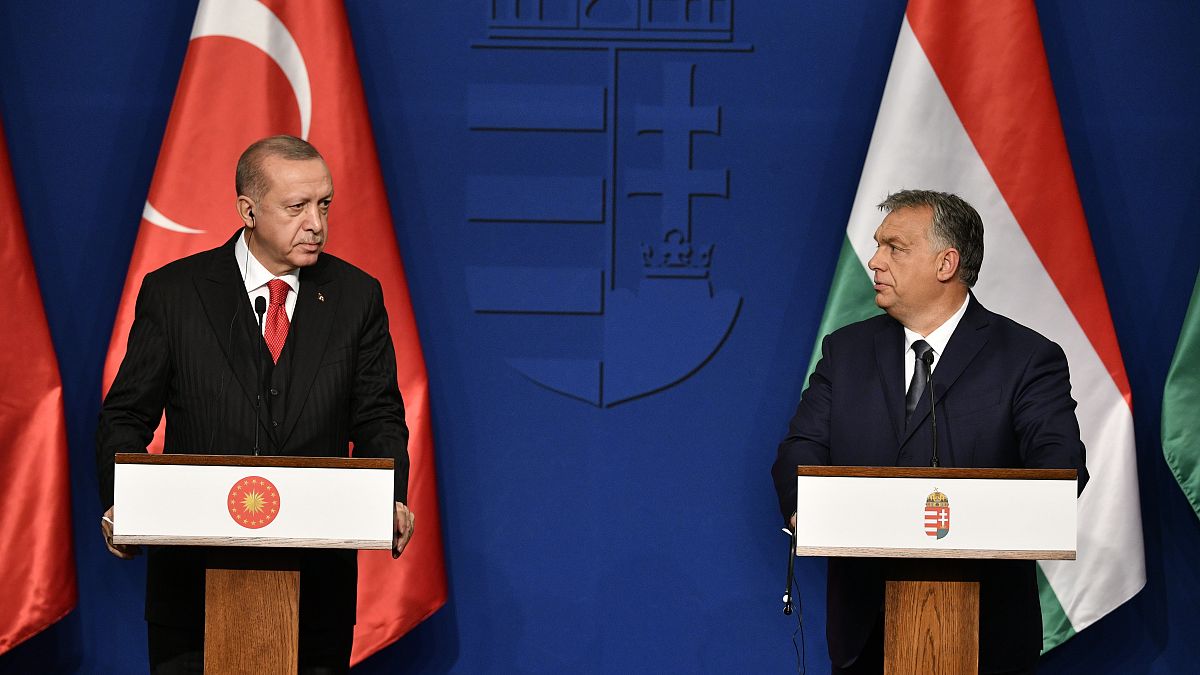Analysis from Euronews' Brussels bureau on the key issues dominating the agenda in the Belgian capital this week.
Russia's war in Ukraine has triggered extraordinary Western unity in the European Union and NATO.
But Hungarian Prime Minister Viktor Orbán and Turkish President Recep Tayyip Erdogan, this week persisted in making the West's efforts to stand up to Vladimir Putin more difficult.
Orbán continues to block the EU's embargo on Russian oil, while Erdogan is against Sweden and Finland joining NATO, accusing the pair of being a safe haven for Kurdish activists.
"Enlargement of NATO is meaningful for us in proportion, as long as they respect our sensitivities," Erdogan said. "It is inconsistent to say, at the least, giving all kinds of support to the PKK and YPG terrorist organisation and asking us for support for NATO membership."
However, NATO Secretary-General, Jens Stoltenberg, is optimistic about finding a solution.
"All allies agree on the importance of NATO enlargement," he said. "We all agree that we must stand together and we all agree that this is an historic moment which we must seize."
More financial aid for Kyiv
Common security was not the only worry in Brussels this week though.
Ukraine's urgent need for financial assistance was too, which EU policymakers are well aware of.
"We are proposing, for Ukraine, to top up the significant short-term relief provided until now with a new exceptional macro-financial assistance to Ukraine of up to €9 billion in 2022," Ursula von der Leyen, European Commission President, said.
Experts say this will only be a drop in the ocean and that pumping relief money – and funds for the military – at such a high rate into Ukraine cannot be sustained forever.
The economy in Europe is already seeing signs of strain. The effects of the war, a global credit tightening to fight inflation and an economic slowdown in China could be a dangerous mix.
On top of this, US Treasury Secretary Janet Yellen also said that the war-torn country needs a new Marshall Plan.
Speaking at the Brussels Economic Forum on Tuesday, Yellen voiced concern that costs for the conflict keep mounting despite funding efforts from Western allies.
Yellen was in the Belgian capital ahead of a meeting of finance ministers for the Group of 7 (G7) leading economies in Germany.
"What's clear is that the bilateral and multilateral support announced so far will not be sufficient to address Ukraine's needs, even in the short term," Yellen said.
"And I sincerely ask all our partners to join us in increasing their financial support to Ukraine."
Schröder in the firing line
MEPs were busy too, passing a resolution that called for former German Chancellor Gerhard Schröder to be added to the long list of individuals blacklisted over Russia's war in Ukraine.
Schröder, a socialist politician, became deeply linked to Russia's state-owned energy companies after serving as federal chancellor from 1998 to 2005.
His dealings with Nord Stream, Rosneft and Gazprom, as well as his close relationship with President Vladimir Putin of Russia, had for years been a source of controversy and a glaring example of a revolving door.
But as the Kremlin began bombing and shelling Ukraine, the former chancellor's liaisons were brought to the fore, putting Germany's ruling socialist party in an extremely uncomfortable position.
A recent interview with the New York Times, in which Schröder stood defiant and unapologetic, further fuelled the international outrage around his business ties.
"I don’t do mea culpa," the former chancellor said. "It's not my thing."
The European Parliament's resolution, which passed on Thursday with 575 votes in favour, is non-binding and is seen as a symbolic call for action.
It was signed by the main political groups in the hemicycle: the centre-right European People's Party (EPP), the liberal Renew Europe, the Greens, the Left and, notably, the Socialists and Democrats (S&D).
